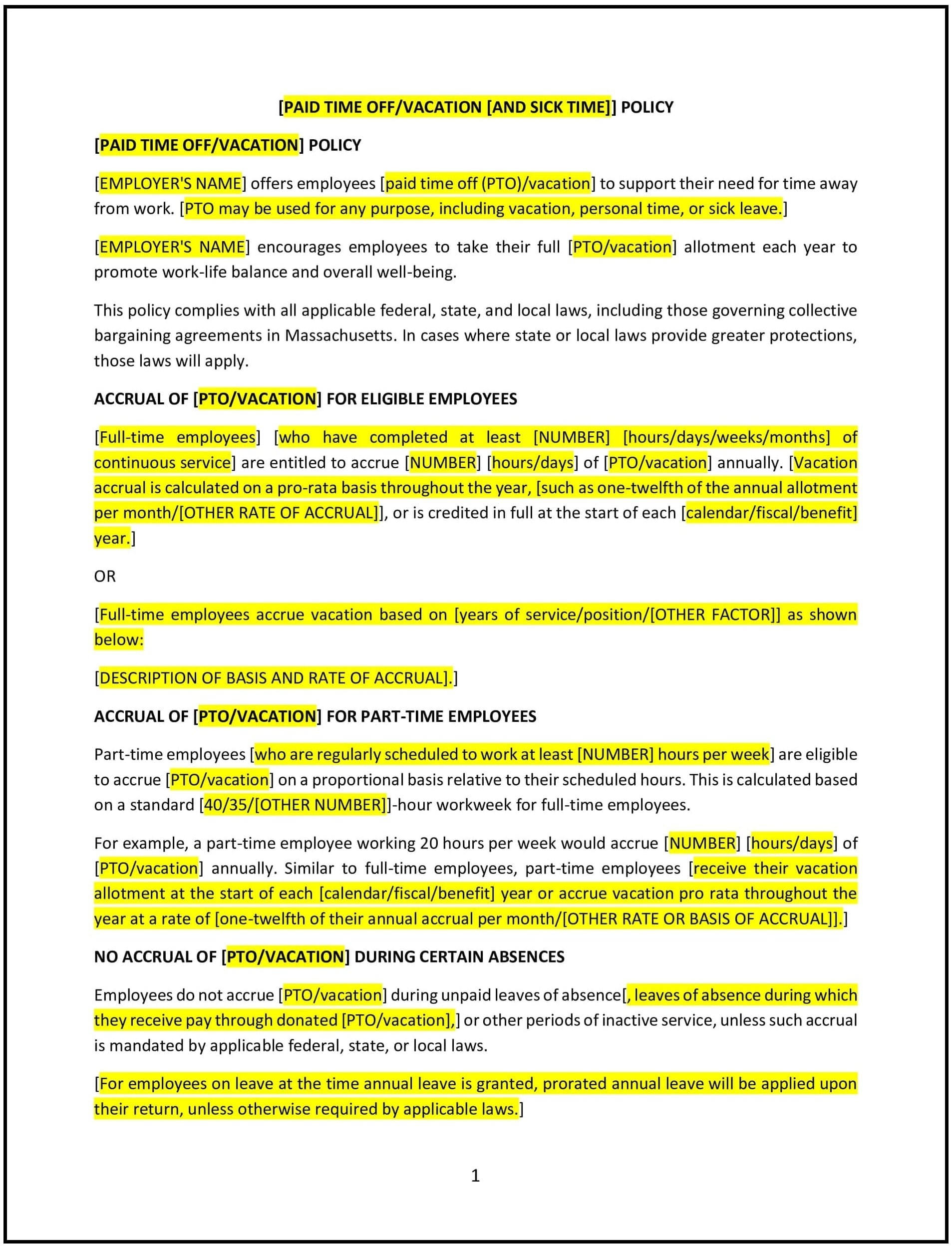Got contracts to review? While you're here for policies, let Cobrief make contract review effortless—start your free review now.

Customize this template for free
This vacation policy is designed to help Massachusetts businesses manage employee vacation time in a fair and consistent manner. The policy outlines the company’s approach to vacation accrual, usage, and approval, ensuring that employees have the opportunity to take time off while maintaining business operations. It helps businesses comply with Massachusetts state laws regarding vacation time and employee leave, while promoting a healthy work-life balance.
By adopting this policy, businesses can ensure that vacation time is allocated fairly, reduce the risk of burnout, and improve employee morale and retention.
How to use this vacation policy (Massachusetts)
- Define vacation accrual: Specify how vacation time is earned, such as by the number of hours worked or length of service with the company. The policy should clarify whether vacation is accrued on a monthly, quarterly, or annual basis, and any limitations on carryover from one year to the next.
- Set vacation usage guidelines: Establish guidelines for when and how vacation time can be taken. This may include requiring employees to submit vacation requests in advance, providing a minimum notice period, and specifying the maximum amount of vacation time that can be taken at once.
- Define the approval process: Outline the process for requesting and approving vacation time. Employees should be informed of how to submit vacation requests, whether it’s through an online system, email, or via their manager, and how far in advance requests should be made. The policy should also explain how requests are reviewed and approved.
- Address carryover and expiration: Specify whether unused vacation time can be carried over into the next year or if it expires at the end of the year. If carryover is allowed, the policy should state the maximum amount of unused vacation that can be carried over and whether any unused time will be forfeited.
- Outline payout procedures: Specify how vacation time will be paid out if an employee leaves the company. This includes outlining whether employees will receive payment for unused vacation time upon termination or resignation and under what conditions.
- Ensure compliance with Massachusetts state laws: Ensure that the policy is compliant with Massachusetts state laws, including the requirement to pay out accrued vacation time when an employee separates from the company. The policy should also comply with any other relevant state regulations regarding employee leave.
- Review and update regularly: Periodically review and update the policy to ensure it is compliant with Massachusetts state laws and reflects any changes in the company’s approach to vacation or employee leave.
Benefits of using this vacation policy (Massachusetts)
This policy offers several benefits for Massachusetts businesses:
- Promotes work-life balance: By providing employees with the opportunity to take vacation time, the company helps employees maintain a healthy work-life balance, reducing stress and improving job satisfaction.
- Increases employee retention: A clear and fair vacation policy shows employees that the company values their well-being, which can help increase retention and reduce turnover.
- Enhances productivity: Well-rested employees are more likely to be engaged, productive, and focused on their work. Vacation time helps employees recharge and return to work with renewed energy.
- Supports legal compliance: The policy helps businesses comply with Massachusetts state laws regarding vacation time and the payment of unused vacation time, reducing the risk of legal disputes or penalties.
- Reduces workplace burnout: Allowing employees to take time off for vacation helps prevent burnout and promotes long-term health and well-being, leading to better performance and morale.
- Improves organizational efficiency: By setting clear guidelines for requesting and using vacation time, businesses can better manage scheduling, ensure adequate coverage, and avoid disruption to operations.
Tips for using this vacation policy (Massachusetts)
- Communicate the policy clearly: Ensure that all employees are aware of the vacation policy and understand how it works. Provide the policy in the employee handbook and review it during onboarding or relevant team meetings.
- Track vacation time accurately: Use time-tracking systems to monitor employees’ accrued vacation time and ensure it is properly managed and recorded. This helps prevent misunderstandings regarding how much vacation time an employee has available.
- Be flexible with requests: While it’s important to plan vacation time in advance, be flexible with employee requests to ensure that everyone has the opportunity to take time off while maintaining business operations.
- Plan for adequate coverage: When approving vacation requests, ensure that there is adequate coverage for the employee’s duties. The policy should allow for proper planning and coordination to avoid disruption to the workplace.
- Review and update regularly: Periodically review the policy to ensure it is compliant with Massachusetts state laws, federal regulations, and any changes in the company’s operations or benefits structure.